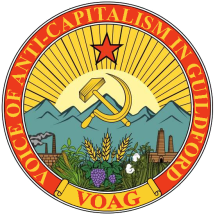 Workers Power Conference 2012: Divisions, Expulsions, & Appeals – The VOAG Investigates.
Workers Power Conference 2012: Divisions, Expulsions, & Appeals – The VOAG Investigates.
Workers Power, a small communist group had its conference over the weekend. The conference was dominated be factionalism and division. Two people were expelled, and although as yet there have been no formal splits, resignations from the National and Political Committees surely herald one in the coming days.
The conference began on Saturday 24th, March with two members formally appealing against their expulsions. In true Weekly Worker style, the VOAG (Voice Of Anti-Capitalism in Guildford) publishes the first of the two expulsion appeals – Delivered to the conference as a speech.
Bureaucrat Expulsion
I went to two meetings in Manchester where I met with half a dozen people from the RSO, Socialist Fight and others. There were two subsequent meetings in Manchester, but neither I nor Cde B. attended them.
Like all members of Workers Power, I attend meetings organised by a number of different groups. I didn’t consider my attendance at this meeting any different than attending an SWP or SP meeting or indeed holding discussions with local Anarchists or anti-cuts campaigners.
There was a variety of attitudes regarding what might be achieved by the discussions. Opinions ranged from formalising a new group to continued informal discussions. I made it clear that my interest in the meetings was from within the framework of an Anti-Capitalist project
I recall prior to joining Workers Power, speaking to the 2009 Anti-Capitalist event. I told the conference:”What we really want is local groups, we have to come together at a local level because we don’t believe that political groups are capable of achieving a meaningful unity on a National basis”. “An Anti-Capitalist Party must be built from below, as an umbrella organisation connecting local Anti-Capitalist groups with the flexibility and freedom to react and adapt to local conditions”.
“However “, I added: “The Anti-Capitalist Party was not a replacement for existing groups, but a way for existing groups – along with non-aligned activists and anti-cuts campaigners – to work together” It was the feeling of the Surrey United Anti-Capitalists, “that a federal approach to a new Anti-Capitalist Party may provide the break-through to a successful ‘unity project”. This continues to be my belief. It is surely imperative to maintain ideological coherence by struggling for a clear programme via democratic centralism, a paper and our identity.
Late in the evening before the NC meeting in January, I received a phone call from Cde B. He told me he had received an email from the NC regarding the meetings inManchester. He forwarded an email to me, which had been sent from Simon Hardy to the members of the NC. The email contained correspondence between Cde B. and Gerry Downing. The emails addressed issues that arose out of the Manchester meetings and included a discussion about what kind of an organisation, if any, might arise out of them.
I too have had similar discussions. If the Anti-Capitalist Party is to be a Party of the working class, it must encourage the entire labour movement to sign up- and be a forum where theories and practices are put to the test. As Richard Brenner asked rhetorically in Workers Power 341, (Winter 2009): “Do we say that we want it to be a pluralist party? We want a democratic party in which everyone can say what they think. But another feature is that we want to win the argument in the party for revolution”.
It should be obvious that winning the argument for revolution requires a functioning group, faction or caucus to consistently argue for revolutionary Trotskyist politics inside the Anti-Capitalist project. Only Trotskyism has the programme that can defeat and replace the existing leadership of the working class by the method of the transitional programme. Bringing down the government and leading the working class to a socialist future.
I was aware that discussions were continuing between the participants of the Manchester meetings. Naturally, I too discussed these meetings. However, neither I nor Cde B. participated in the e-group where the emails Simon presented to the NC originated. Indeed, I didn’t know of the existence of the e-group.
Simon Hardy was leading the proposal for my expulsion. No accusations regarding a breach of discipline were leveled against me. Simon’s sole charge was that I “attended a meeting of a group hostile to Workers Power and the Anti-Capitalist project”.
My answer to Simon was, and still is: “that we all attend meetings with groups hostile to Workers Power. However, I didn’t discuss or impart any privileged information regarding Workers Power and I don’t believe Cde B. did either”.
I must add to this now, that Simon is wrong regarding the caucus’ hostility to “Anti Capitalism”. It is my understanding that Socialist Fight, and the other participants in Manchester, with the exception of the RSO, were in favour of joining an Anti-Capitalist project.
Cde B. may have made references to divisions in Workers Power, but I do not believe any details beyond what was in the public domain, were ever discussed. I do not accept Cde B. or I broke discipline or any democratic-centralist principle.
Cde B. has consistently been one of the most active members of Workers Power inLondon. He is well known and respected for his work within the GRL. He has been involved in numerous campaigns, the electricians and bus drivers’ disputes being recent examples. Billy is also the most consistent recruiter. There are people in this conference today that Billy either recruited or introduced to Workers Power. Indeed, I believe it would be foolish for any rump that may continue after this conference not to actively recruit Billy to it.
No, I think it is obvious to us all that the real splitters are those who have finally broken cover at this conference to propose liquidation. It is they who have been undermining Workers Power, and as we shall see – in their rush to promote their vision of an Anti-Capitalist formation – have already broken from democratic centralist methodology. Far from seeking to split Workers Power, Cde B. was looking for ways to save its politics and programme, the very reason Cde B. and I joined the group in the first place.
Libya
The first major retreat from the programme was over Libya. Unlike the majority of Workers Power, I saw no basis to believe that a popular or progressive uprising was unfolding. Indeed, behind the headlines there was plenty of reason to assume the opposite. Whilst Workers Power rapped their support for the NTC in the flag of Permanent Revolution, I felt those same arguments correctly applied to the forces supporting Gadaffi.
The most disturbing aspect of Workers Power’s support for the NTC was that the NTC was openly courting the patronage of the imperialist powers. It even promised western companies “preferential treatment” in what amounted to another arms for oil deal.
Leon Trotsky, “On the Sino-Japanese War”, wrote: “The Trotskyists, they say, ‘want to serve Chiang Kai-shek in action and the proletariat in words’. To participate actively and consciously in the war does not mean ‘to serve Chiang Kai-shek’ but to serve the independence of a colonial country in spite of Chiang Kai-shek. And the words directed against the Kuomintang are the means of educating the masses for the overthrow of Chiang Kai-shek”. “You cannot advance Imperialism’s victory and the victory of the working class at the same time”.
The leadership’s justification for their Libyan position was in the name of democracy and abstract liberal freedoms. In the early days of the conflict, I questioned the leadership about the lack of reliable evidence substantiating claims that it was a genuine popular uprising. Where was the general strike? Where were the mass demonstrations? In terms of numbers, it appeared that the rallies in support of Gadaffi were always larger than NTC organised events. Indeed, apart from a couple of small demonstrations, the only forces that the NTC commanded were rag-tag militias backed up by a few tribes and foreign interventionists”.
I find it Ironic that I’m appealing my expulsion, when those that are most keen on it are seeking to dissolve Workers Power anyway. It appears I am accused of breaking democratic centralism. However, it is my feeling that democratic centralist discipline broke down in WP some months ago.
The paper has ceased to be a coherent representation of the group. Under Simon Hardy’s editorship the paper has become the arena for internal differences between an old guard, and a middle class clique, running to the right and away from the working class. Their duplicity and dishonesty is exposed by their inconsistent and ever rightward stances in the paper.
Occupy – The 99%
With regards to the Occupy movement: Sceptical comments such as “the 1% as they have been called by the occupiers”. Criticisms such as “[occupy’s] limitation of always talking about “the people”. And calls for “discussions as to who constitutes the main agency of change”. (November’s issue of WP) have disappeared from the pages of WP.
Such comments and criticisms have been gradually replaced by a populist, un-critical support for the Occupy movement. And has led to a banner reading “We are the 99%” on the top of the South London Anti- Capitalist Network blog.
In contrast, on the WP blog last week, Dave Stockton, referring to ‘Occupy’ notes the: “necessity of working class direct action –that is, strikes – seemed to escape the more doctrinaire horizontals”…”In fact horizontalism- is an expression of layers and classes whose position in capitalist society gives them no natural unity: the lower middle classes, students, long term unemployed and intellectuals, who seek to escape cut-throat capitalist competition but at the same time feel collectivity, especially discipline imposed by a majority, an intolerable violation of their freedom”.
Compare that to March’s Workers Power, ‘Next steps for the Occupy movement’ in which Anton Solka writes “We are the 99% has brought the issue of class to the fore, there really is an us and them.”
Personally, I consider myself to be working class and not one of the 99%. My interests run contrary to many of the 99%. – And I would expect Workers Power to argue for class politics; warn of the dangers and Stalinist origin of popular frontism, and expose the contradictions within the 99% movement.
As with Libya, elements of Workers Power, with scant sources of information provided by the bourgeois media, has jumped on to the populist bandwagon of democracy and freedom. Support for the autonomist, environmentalist and horizontalist forces – those that are described by the clique struggling to break up our group as ‘New Left’ – may have temporarily grown, but there is nothing qualitatively new in Occupy. This ideology and methodology has been part of the political scenery for decades. The leaders of London’s Occupy are not just of the same milieu, but in many cases are the very same people that were on the peace camps and convoys of the eighties, on the road protests of the 90’s, and on the occupations and climate camps of the naughties.
Anti-Capitalism
As far as the Anti-Capitalist project goes; the Workers Power paper rarely repeats the same line twice. In February’s Workers Power article, “Labour in the Unions” Dave Stockton appeals to the unions to “put their money behind building a new fighting, Socialist Party”…”It must be a party whose aim is not to court the selfish individualism of the middle classes, but to lead the working class in a struggle for power”.
Simon Hardy writes in February’s paper “It is the battle to unite the anti–cuts movement, to create a new sense of energy and activism that UKUncut and Occupy exemplified. Although in the Editorial of the same month he writes: “In Britain, too, after an initial breakthrough, Occupy has reached a dead end”. Such is the retreat to the right, that even the name Anti-Capitalist is too radical for some in Workers Power. The group set up in Brighton is called the New Left Initiative.
In Conclusion
In conclusion, there are several common threads running through Workers Power at present.
In Libya WP elevated bourgeois democratic demands over the economic needs of the working class. With little information to support the position, WP opportunistically rode the wave of populism and supported the NTC. Its position sacrificed the security of the Libyan people, its welfare state, and its resources for democratic freedoms that will never be achieved and for the illusion of parliamentarianism.
Again in the paper’s coverage of the Occupy movement and its 99% slogan, a faction of WP showed itself to be impressionistic. With little first-hand experience of the occupations, WP used second hand reports to analyse occupy. Here again elements in WP bent to populist sentiment and degenerated into uncritical support for the occupy movement. They sacrificed class analysis for democratic demands, popular frontism and horizontalism. As Dave Stockton said above: “These are the politics of the petit-bourgeois”.
It seems to me that the reason for the inconsistencies in the paper of late is not just the result of arguments on the PC, largely hidden from the membership. It is the result of a middle class clique in Workers Power looking for a way out and using Anti-Capitalism as their vehicle. Why else are they suddenly so enthusiastic about a project that’s been talked about for years. Why else would they be rushing headlong in to forming Anti-Capitalist groups before WP has decided the nature of this Anti-Capitalist project?
The rub, the elephant in the room, is finally exposed on paragraphs 20 and 21 of the draft proposal to the NC (included in the pre-conference IB.). Regarding Anti-Capitalism it says: “We will not declare a formal tendency or platform” – [But somehow] “will remain members of the League”. I don’t really think these people have thought this thing through. Does this clique really expect to reconcile plurality and democratic centralism within the same organisation? Or indeed, expect to remain members of the League, whose rules of affiliation insist on a regular paper. Read the rules of the League! You’re so gone. It’s these inconsistencies, and there are many, many, more, that make me realise the clique’s sudden enthusiasm for Anti-Capitalism is an unprincipled retreat into petite-bourgeois acceptability. We’re lefties, but harmless, and oh so intellectual they tell their peers. After-all, they’re reaching that age.
A post-script: Today – 9th April
It’s just two weeks after the above speech was delivered to the WP Annual Conference. News is reaching the VOAG that Workers Power is splitting. The VOAG believes that it totally vindicates everything that the two comrades who were expelled told the conference. It follows a complete breakdown in the democratic centralist principles professed by Workers Power, mentioned above. Those of the ‘central tendency’ who claim to remain Leninists, saying they want to continue to build WP as a tendency in the worker’s movement, could have and should have put a stop to the machinations of the right-wing splitters long ago. Their refusal to do so shows their opportunism, and has led to this unnecessary impasse. The right-wing, liquidationist splitters should have been expelled long ago for breaches of discipline and democratic centralism. The fact that they were not proves the degeneration and right-wing, petite-bourgeois trajectory of the entire group. 
 The truth is out: money is just an IOU, and the banks are rolling in it
The truth is out: money is just an IOU, and the banks are rolling in it To get a sense of how radical the Bank’s new position is, consider the conventional view, which continues to be the basis of all respectable debate on public policy. People put their money in banks. Banks then lend that money out at interest – either to consumers, or to entrepreneurs willing to invest it in some profitable enterprise. True, the fractional reserve system does allow banks to lend out considerably more than they hold in reserve, and true, if savings don’t suffice, private banks can seek to borrow more from the central bank.
To get a sense of how radical the Bank’s new position is, consider the conventional view, which continues to be the basis of all respectable debate on public policy. People put their money in banks. Banks then lend that money out at interest – either to consumers, or to entrepreneurs willing to invest it in some profitable enterprise. True, the fractional reserve system does allow banks to lend out considerably more than they hold in reserve, and true, if savings don’t suffice, private banks can seek to borrow more from the central bank.








You must be logged in to post a comment.